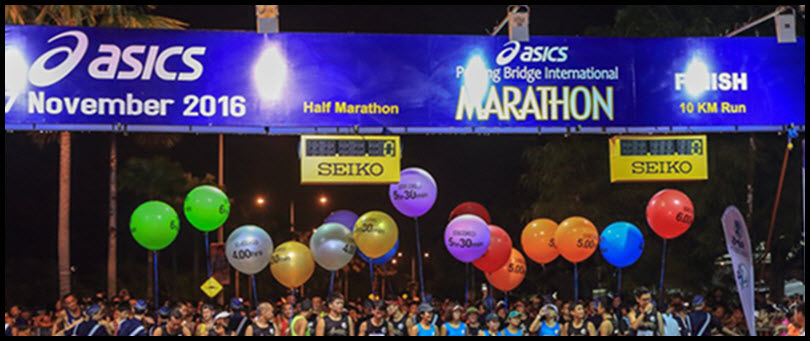
Do you struggle a bit with pacing yourself in those races you’ve trained so hard for? If so, you’re not alone. So it makes sense to use a race pacer in your next big event, right?… Or not
Most big races these days have race pacers which will help you to get to the finish line on target. Pacers are expected to finish on their pace time, or no more than 2 minutes faster. It sounds like a good strategy to hook up with a pace group and hang onto them for as long as you can, but running with a pace group isn’t always the best way to hit get your best time.
Consider This When Using a Race Pacer
- Race oganisers often ask local running clubs to supply pacers. It’s possible your pacer is pacing a group which is only slightly below their own ability – which means if the pacer is having a bad day, they are going to find it hard to make the target time themselves, let alone help you to reach your target!
- Usually, pacers are targeting a time which is quite a bit slower than their ability – which does come with it’s own issues. The pacer is most likely running at an easy or easy/moderate pace to hit the target pace that you have to work so hard for. They therefore won’t need to vary their pace over different terrain. For example, let’s say you’re aiming for a 1:50 half marathon. Your average pace will need to be a bit over 5:10 per km. But your pacer might be able to complete a half marathon at 4:10 per km pace. They can easily maintain 5:10 per km going up a hill, but you most likely can’t without burning too much gas. Sticking with the pacer as they power up a hill could cause you to blow up later in the race. Because the pacer doesn’t need to employ optimal racing pace to achieve the target time, an inexperienced pacer will stick to the same pace, kilometre after kilometre.
- Pacers are keen to get you to the finish line within your goal time. Sometimes a bit too keen. Because they have the ability to run quite a bit faster than your goal pace, it won’t matter to a pacer if they run too fast at the start – they will have no problem finishing the race still in the target time, but you will.
- Don’t assume that all pacers have a lot of experience, either as pacers, or even as race participants. Like the rest of the field, pacers come at all experience levels. And just like the rest of the field, there will be some pacers who think that if they take you out faster at the start, you can “bank” time, and afford to drop off a bit at the end. Really, that strategy just won’t work. And logically, if you go slightly slower at the start, you won’t have to slow down at the end!
- I remember seeing a post once from a pacer which showed her finish time as 17 minutes faster than the target time, and the caption “Whoops”. Imagine if you’d been following this pacer – any hope of hitting your target time would be out the window (unless you’d grossly underestimated your ability and you did a massive PB by staying with her!)
- Most recreational runners over estimate the speed they can run a race in, and women are more overconfident in their race time predictions than men. Choosing a pace group when you are likely to have over estimated your ability, and sticking with that pacer, even if you feel the pace is a bit fast for you, is the worst race strategy possible!
- Pacers usually pace on gun time, not on their timing chip time, so they start timing your race from the moment the gun goes, not from the time you cross the start line. If it takes you two minutes to get across the start line, the pacer could be aiming for a target time which in real time will be two minutes faster than their pace time. In a half marathon, that could be six seconds per km faster. That doesn’t sound like much, but it’s a fair whack kilometre after kilometre.
How to make good use of pace groups
Don’t get too attached to a pace group at the start of the race
Your first priority when you start an event is to settle into a good rhythm and pace you’ll be able to maintain for the entire race. It’s easy to get caught up in the excitement at the start and go out too fast, and that applies to pacers as well. For the first quarter of your race, ignore the pacers. Spend this time settling into your race, and run on how you feel. After about the first 5ks in a half marathon, and the first 8-10km in a marathon, have a look around for a pace group which is running around the same pace as you are.
Don’t get too attached to a pace group during the rest of the race!
Each of us have our own strengths and weaknesses, often related to terrain. You might be an awesome uphill runner, but struggle to make up much time on the downhill. Or you might be able to power downhill like their’s no tomorrow, but tend to fall off a bit on the uphill segments. How much you will lose and gain on the hills is a very individual thing, so be prepared to fall off the group if you know you’ll be able to catch up a bit when the terrain is more suited to your strength.
Be prepared to feel good (and not so good)
There’ll be parts of your race where you feel like a god, and there will probably be parts of your race when you question the wisdom of ever entering the event in the first place. Whilst running with a pace group can help you through these rough patches, it may also push you to run faster than you’re up to at that point in time, and spoil any chance you have of hitting your goal time. Sometimes you’ll just have to run parts of your race slower than planned. At these times, you’re mentally a bit fragile. If you’re not prepared for it, dropping off the pace group could be the straw that breaks the camel’s back. Conversely, when you’re feeling good, you want to be able to capitalise on that, so staying with the pace group may hold you back.
Move away from the group at water stations
If you’re running in a big pace group, it might cause overcrowding at water stations, or when you’re running around tight bends. You should consider either moving forward of the pace group before water stations if you’re feeling good, or be happy to drop off the back a bit. You want to be sure to take on board the water you need, and you also want to avoid tripping in that crowded water station or tight bend.
Ask the pacer what their strategy is to get you to the finish on time
Once you’ve settled into a good rhythm and pace and you’ve found a pace group that suits you, ask the pacer what time they have on their watch. If you’re aiming for a net time (that is the time from when you cross the start line until when you cross the finish line), this could make a difference to how you use the pace group. If the pacer has 30 minutes on her watch, and you’re only at 28 minutes because you started your watch when you crossed the start line not when the gun went, you know you have 2 minutes up your sleeve. So if the pacer is urging runners on and you’re not feeling like you can go with them – keep in mind that they are running for a gun time, not a net time, and that you can afford to let them get away on you a bit and still finish on target.
Ask the pacer if they are planning on running even splits – each kilometre the same pace, or if they are taking hills and fatigue into account. You can use this information, along with your own sense of how you’re feeling, to keep on top of things mentally through the race. If you know the pacer isn’t going to slow down going up a hill, but isn’t going to get much faster down a hill, it makes it a lot easier mentally to let them go, if you know you can catch up on the downhill.
I’m all for people who give up their time to help other people reach their goals, so I applaud pacers. For the most part, they do a great job. They don’t intentionally go out too fast, or push too hard up a hill. They just don’t realise that to keep up the pace, you’re pushing yourself every step, whilst they’re breezing through the race as if it’s a training run! At the end of the day, you have to race on how you feel. Pacers can be good motivation, but you need to trust your instincts. Talk to the pacer to find out their race plan, make use of them and their surrounding group for motivation, but if you can feel you’re really struggling to hold onto a pace group, or you feel they are holding you back, your best bet is to let go.


